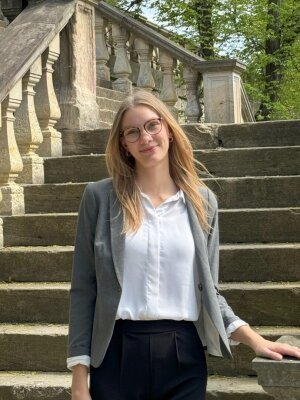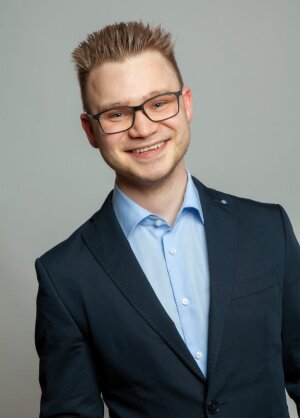
Dear (potential) outgoing students,
If you are interested in spending a semester abroad, you have come to the right place! In addition to the information events we, as your Study Abroad Team, organize throughout each fall semester, you can find everything you need on this website.
To make it as easy as possible for you, we have included links to almost every resource you might need to plan your semester abroad.
If you are looking for a short overview, you are also invited to download our presentation herepdf, 1 mb · de or just go on reading!
-
General Information and Guiding Questions
As your Study Abroad Coordinators, we mainly focus on the Erasmus+ partnerships directly managed by the Institute of Political Science. The relevant places are 1) exclusively available to students at our institute and 2) have sufficient course offers (see place offer below). These tailor-made agreements are specifically designed for you and give you the chance to study in France, the United Kingdom, Poland, Finland, the United States, Norway, Spain, and many more destinations.
To decide when to apply and which destination best suits your personal preferences, you should consider the following factors, all of which require you to plan well in advance:
- Timing: If you want to apply for a place abroad, you must do so around one year before the start of your planned stay. BA students can only apply in the third semester to spend the fifth semester abroad. MA students are recommended to apply directly in the first semester of their studies to go abroad in the third semester.
- Duration: Not only the timing but also the duration of your stay should be considered. At some of our partners, you have the opportunity to stay for two semesters instead of one. Furthermore, you may also want to do an internship abroad. Therefore, you should plan the course of your studies accordingly.
- Course Offer: The choice of your destination should depend not only on your interest in the country or city in question but also on the course offer at the partner university. The courses you will attend must complement your curriculum in Jena (around 30 ECTS) and should fit your interests and personal focus.
- Final Thesis: Usually, the semester abroad is the last one before you write your final thesis. Therefore, you should approach your supervisors before your leave to clarify your participation in the “Oberseminar” and to set up your thesis.
Please note that we are only responsible for the study-related aspects of your stay abroad (provision of information, course selection, and course recognition). All further questions (e.g., about funding, housing, or insurances) should be directed to the FSU’s International Office.
-
Our Place Offer
Herepdf, 152 kb · de you can download the list with our exclusive political science partnerships. The table provides information regarding the specific destination (country, city, and university), number of available places, related study cycles (BA, MA, and Ph.D.), the possible duration of your stay (1 or 2 semesters), and links for getting further information about the specific university.
Please note that you can still apply for these places if you are not a political science student. However, students from our institute will be prioritized during place allocation.
If you are looking for other opportunities to study abroad, please see the Other Ways to Study Abroad section below.
-
Financing Your Stay
As a participant in the Erasmus+ program, you will not have to pay tuition fees and receive a scholarship to help finance your stay. The specific amount depends on the country you have chosen. With this, however, you will not be able to cover all your expenses and should therefore have additional means available.
In order to receive the Erasmus+ scholarship, you must comply with the formal regulations of the program and complete around 30 ECTS. The German Academic Exchange Service (DAAD) has the latest informationExternal link about the amounts of scholarships for students from Germany.
If you are not participating in the Erasmus+ program (e.g., if you go to study in Rhode Island/USA), you can still receive funding. Particularly worth mentioning here are the PROMOS program, the German student loan (“BAFöG”), and the many scholarships of the DAAD. Here you can find an overview of the different funding programs.
Please note that as your Study Abroad Coordinators, we are not involved in any financial aspects of your stay and can only provide general information.
-
Application
Please submit your application for the places administered by the institute or that are part of the EC2U initiative (see “other ways”) in German or English by January 15 to powi.international@uni-jena.de.
We only accept applications that 1) reach us within the deadline, 2) are organized as one PDF, and 3) are sent via your “uni-jena.de” mail account! Applications for other places must be submitted to the FSU’s International Office.
The following documents are required:
- ERASMUS+ application form
(You don't have to sign the document by hand, a digital signature is sufficient. Please set the page to German in the top righthand corner, otherwise the documents aren't visible) - Letter of Motivation (max. 1 page)
- Tabular CV
- Friedolin-Overview of grades (BA students) or BA certificate (MA students)
- Language proof*
*All participants must demonstrate sufficient language skills, usually defined as English at level B2 according to the Common European Framework of Reference for Languages (CEFR)External link.
To prove your language proficiency, BA students have to pass the institute’s english testExternal link, which is offered every semester and free. MA students already fulfill this requirement with their successful applications to our study programs.
- ERASMUS+ application form
-
The Way Ahead
After the application deadline has passed, we will start reviewing your applications and conduct the place allocation. By February 15, you will receive a place offer. Once you have accepted the place, the FSU’s International Office and the related partner university will be informed. Usually, partner universities then contact students directly to inform them about the application procedure, etc.
For more details, please see the documents, deadlines, and timeline website provided by the International Office to know what happens after you have applied (e.g., Declaration of Acceptance). The page gives an overview of the whole study abroad process (see timeline) and necessary forms. Do not let the bureaucracy intimidate you. Get started early and reach out if you run into problems!
You have questions about the learning agreement or the course recognition? Check out the videos below.
-
Learning Agreement & Course Recognition
The learning agreement and the course recognition document are essential for managing your courses abroad. The learning agreement records the courses you want to take abroad and the modules from Jena for which these courses are to be recognized. The courses must be coordinated with the sending and receiving institution’s coordinators. There is one LA to indicate the courses you are aiming to attend before you go abroad, one after you have arrived to display changes if necessary, and a third one to show the courses you have passed. After the signature, you must submit each agreement to the FSU’s International Office. There is a growing number of partner universities, that use Erasmus without Papers (EWP) and the online Platform MoveOn. If your chosen partner university supports EWP, you will not have to fill in the PDF or Word document, but fill in the online form which is provided via MoveOn. You will be given login information by the international office once it’s time to do so.
The course recognition documentdocx, 102 kb · de works similarly. It lists your courses from abroad, the corresponding modules from Jena, as well as the ECTS, grades, and exam numbers. After your return, please complete the templatedocx, 102 kb · de with your Transcript of Records from your guest university (courses, modules, and exam numbers) and send it to your coordinators. We will convert the grades and the credit points to the German/Jena system. Afterward, the recognition form and the transcript need to be sent to the Academic Office for Student Affairs and Examinations (ASPA), which adds the courses to Friedolin. We will send the signed course recognition document, as well as your official Transcript of Records from your host university and your latest learning agreement to the ASPA. Please don’t do so yourself, as the ASPA won’t accept that.
Please note that your ECTS and grades must be transferred to the German/Jena system, as most foreign universities have different procedures. The grade conversion is done via the Anabin databaseExternal link. The ECTS conversion is based on a rounding system where courses with 3 to 7 ECTS abroad are recognized as 5 ECTS in Jena, and courses with more than 7.5 ECTS abroad are recognized as 10 ECTS in Jena.
If you have the impression that this rule does not apply to the courses you attend, you are welcome to contact us so that we can determine the exact workload according to the module catalog and the course description. As an orientation, please consider a regular seminar in Jena: It covers 5 ECTS and includes about 15 sessions of 1.5 hours each, as well as a minor exam (e.g., presentation), a major exam (e.g., term paper), and self-study.
For further questions about course recognition, please check out our video tutorial. -
Other Ways to Study Abroad
Beyond the places provided by our institute, there are additional opportunities to go abroad. These are primarily managed by the FSU’s International Office and available to all students, so you should expect higher competition. Furthermore, you must ensure that sufficient political science courses are available at the respective university.
You have the following alternative options to study abroad:
- European Campus of City-Universities (EC2U): de This is an alliance of the University of Coimbra (Portugal), Alexandru Ioan Cuza University in Iaşi (Romania), Friedrich Schiller University Jena (Germany), University of Pavia (Italy), University of Poitiers (France), University of Salamanca (Spain), University of Turku (Finland). The initiative is part of the Erasmus+ program. Applications must be submitted by January 15 to international@uni-jena.de (see Application section), and the International Office will allocate the places.
- Erasmus+ ICM (worldwide): These exchanges with selected partner universities of the FSU Jena take you beyond Europe. The related places, however, are subject to the Erasmus+ program and procedures. Universities from the following countries participate: Argentina, Armenia, Belarus, Canada, Georgia, Israel, Japan, Moldova, Russia, South Africa, Ukraine, and the USA. Applications have to be submitted to the International Office.
- Global Cooperation Agreements: The FSU has various bilateral cooperation agreements with universities around the globe to promote student mobility beyond Europe (no tuition fees). Please see the continent and university-specific requirements and be aware of the different application deadlines. Applications have to be submitted to the International Office.
- IDEAS:External link This DAAD-funded project promotes the internationalization of the teacher training program at Friedrich Schiller University Jena. The following universities take part: Tbilisi State University (Georgia), Universitat de Barcelona (Spain), Higher School of Economics (Russia), Université de Montréal (Canada), Georgia College (USA), and Universidad Nacional de San Martín (Argentina). For more information, please contact: ideas@uni-jena.de.
- Erasmus+ Places of Other Institutes: You are free to apply for Erasmus+ places at other institutes. However, please note that students of the respective discipline will be given a higher priority and that you have to make sure that a suitable course offer is available at the selected university. Applications must be addressed to the relevant Erasmus coordinators.
If you are not participating in the Erasmus+ program, you can still receive funding for your stay abroad. Particularly worth mentioning here are the PROMOS program, the German student loan (“BAFöG”), and the many scholarships of the DAAD. Here you can find an overview of the different funding opportunities.
-
FAQs
Can I submit several applications for different programs at the same time?
Yes, you may submit several applications at the same time. Note, however, that you can indicate up to three priorities for most programs and thus have a good chance of success with just one application. In addition, places you have been allocated but do not accept cannot always be reassigned, which means you may be taking the opportunity away from another student.
Will I get my first choice placement?
In many instances yes, but not always. According to our experience, we have more places at many partner universities than applicants; however, there will be competition for some places. We therefore ask you to indicate your second and third choices.
How do I select courses?
For courses to be recognized, they must match your uncompleted modules in Jena. For example, to complete a (part)module in International Relations, you must successfully complete related courses abroad. Overall, you are expected to complete a total of approximately 30 ECTS. If the credit points per course differ, they can be converted to our system.
Am I allowed to attend classes that do not fit my curriculum in Jena?
Yes, this is possible. However, courses that do not fit the curriculum in Jena (e.g., language courses) cannot be recognized and therefore do not count towards your final grade. However, they can be registered on your diploma supplement.
How many credits do I have to earn abroad?
The standard workload per semester in Europe is 30 ECTS. Also the Erasmus+ mobility grant is linked to the completion of about 30 ECTS. Therefore, you should aim for 30 ECTS, converted to the Jena model. Due to the different module catalog, IOCM students should complete at least 20 ECTS abroad.
Will my classes be recognized?
Yes, provided you have concluded a Learning Agreement with your Study Abroad Coordinators and successfully completed the related classes. Further information can be found here.
I received a place abroad at another institute; who advises me?
Although a different institute allocated the place, we are responsible for course recognition. You should therefore contact us as soon as you have a place in sight so that we can advise you and ensure that your courses will be recognized after you have returned from your stay.
Should I request a semester of leave?
This depends on your personal situation. With a leave of absence, you will not have to pay any administrative fees at FSU. The consequence, however, is that you are not allowed to take any exams during the respective semester (e.g., retry exam or registration for final thesis). Most students opt for a semester of leave, in our experience. Here you can find more information provided by Student Service Centre, responsible for this matter.
How do I cancel my stay abroad?
If you no longer want to pursue your stay abroad, you can cancel it. In this case, you are responsible for informing 1) us, 2) the International Office, and 3) the respective partner university. If you have already received funding, these funds must be repaid. Please think carefully before you cancel your place, as it probably cannot be reassigned.
- Filling the Recognition Form
For the Institute of Political Science, Steve Biedermann & Tim Haas serve as your Study Abroad Coordinators. We are both Ph.D. candidates and work as research associates, so there is a good chance you already know us! Further, our assistant Kayla Draheim supports us in many regards.
We are happy to help you with all study-related questions you might have and realize that organizing your stay abroad can be a demanding undertaking. But do not worry, it will be worth the effort. You can reach us via powi.international@uni-jena.de.
If you are looking for more information, please visit the studying abroad website of the International Office. Here you will find an overview of all available programs and places, forms, and tips for preparing for your stay, and much more.
Ina Luise Siemer
Image: Ina Luise SiemerIna Siemer
Tim Haas
Image: Kristin Döpel-Rabe (Ebenbild Jena)Tim Haas
Kayla Draheim
Image: Olga Tserulnik

